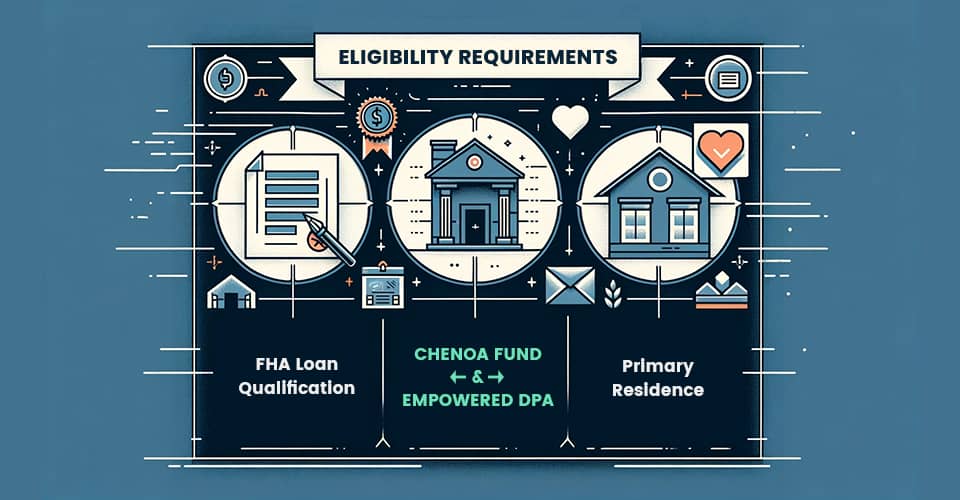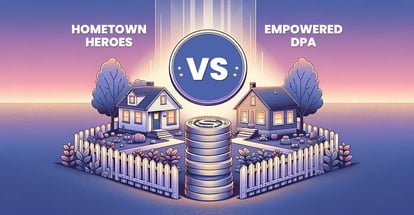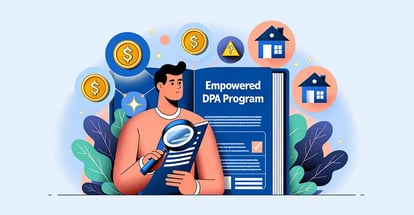Chenoa Fund Vs. Empowered DPA - Comparison
Eligibility Requirements
Understanding the intricacies of the Chenoa Fund and Empowered DPA is critical for prospective homeowners. While both require a minimum credit score and adherence to income limits, Chenoa demands a DTI below a certain threshold, and Empowered DPA caters to specific professions.
Navigating the DPA programs like Chenoa Fund and Empowered DPA effectively can open doors for many homebuyers to achieve homeownership, even with specific financial or professional constraints.
If you're a prospective homeowner, understanding the eligibility requirements of the Chenoa Fund and the Empowered DPA can give you an edge.
While both require an FHA loan approval, the Chenoa Fund sets a benchmark credit score, while Empowered DPA targets certain demographics and income levels.

Credit Score
The credit score requirement is a crucial factor in both the Chenoa Fund and the Empowered DPA programs.
To ensure that the beneficiaries have a history of responsible credit management, the Chenoa Fund stipulates a minimum credit score of 600.
Comparatively, Florida's Empowered DPA program sets an even higher credit score benchmark – at least 620.
Income Limits
The income limit requirements are a significant eligibility factor for the Chenoa Fund and Empowered DPA programs.
These limits correspond to the median earning of your area, thereby ensuring both schemes chiefly serve those in need.
-
Compare your annual income versus the requirements set by Chenoa Fund and Empowered DPA to find a suitable program.
-
Understand how your area's median income impacts your eligibility for both programs.
- Review the income eligibility guidelines and note that they may vary based on household size, your specific location, and the loan option you're interested in.
FHA Mortgage Qualification
The FHA Mortgage qualification, a prerequisite for the Chenoa Fund and Empowered DPA, is a pivotal factor in the approval process.
The guidelines for this qualification set the foundational requirements applicants must meet to seek down payment assistance.
-
The FHA must insure the loan for both programs.
-
Applicant income should be steady and reliable.
-
The FHA will evaluate the credit history of the applicant.
-
The debt-to-income ratio cannot exceed 48.99% for Empowered DPA or beyond the specified maximum for Chenoa Fund.
- Property types must be within the approved range for both programs.
Debt-to-Income Ratio (DTI)
The assessment measures for the Debt-to-Income Ratio (DTI) of the Empowered DPA and Chenoa Fund hold the deciding authority on the financial health of the borrower.
A deeper dig into the DTI requirement can help find a more suitable program for potential homebuyers.
-
Comparing the given maximum DTI allowed by both programs.
-
Analyzing how both programs calculate the DTI.
-
Discussing the repercussions of exceeding the maximum DTI set by both programs.
- Assessing the flexibility of both programs regarding the percentage of DTI.
Primary Residence Requirement
Regarding primary residence requirements, both the Chenoa Fund and Empowered DPA loan programs share a common goal - to boost homeownership, not real estate speculation.
Therefore, they mandate that the purchased property be for personal use, not for investment or vacation purposes.
-
The purchased property must be your principal residence.
-
Investment properties or vacation homes don't qualify.
- Both programs aim to encourage homeownership, not investment.
Chenoa Fund Program Options
When weighing the choices between Chenoa Fund and Empowered DPA programs, potential homebuyers can find various options tailored to their needs. Both offer multiple levels of down payment assistance and differing repayment terms, tuned for diverse financial situations.
The breadth of options with Chenoa Fund and Empowered DPA underlines the importance of choice. Each program presents a unique blend of features, allowing homebuyers to select the one that aligns best with their circumstances and housing goals.
Repayable
Chenoa Fund presents potential homebuyers with the repayable option. This requires buyers to repay the 3.5% or 5% assistance used for the down payment in full. Repayment terms are favorable, with low interest rates and a specified period.
Repayment conditions will largely depend on your financial situation and future expectations. Both programs offer structures to help buyers comfortably manage repayment alongside the primary mortgage.
The Chenoa Fund's option of 3.5% and 5% repayable assistance is favorable for those foreseeing a stable financial future and confident in their ability to repay assistance over time.
In contrast, the Empowered DPA offers a 3.5% down payment assistance grant. However, the grant conditionally becomes forgivable after the buyer keeps the loan for at least six months, implying no obligation to repay.
The key difference in repayment conditions between both lies in the longer grace period for the Empowered DPA. Nonetheless, Chenoa Fund provides flexibility with the option of a higher down payment assistance repayable.
The Empowered DPA program relieves first-time homebuyers, military personnel, and certain professionals from repayment, while the Chenoa Fund works with an expectation of reimbursement.
Grounded in similar objectives, Empowered DPA and Chenoa Fund aim to support first-time homeowners and those serving in key community roles. However, the detailed terms stipulated could tip the scales for potential homebuyers.
Whether the repayable option is ideal or not depends largely on the borrower's financial confidence and stability. Those sure of their ability to handle the repayable terms can opt for the Chenoa Fund, but those desiring a more forgiving approach can consider the Empowered DPA.
Understanding these repayment conditions, the amount of down payment assistance, and the associated terms can be crucial in making an informed decision between the Chenoa Fund and Empowered DPA.
Forgivable
To ease your journey to homeownership, both the Chenoa Fund and Empowered DPA provide forgivable loan options. These programs ensure a major portion, if not all, of the loan, can be erased after a specified period.
The 'forgivable' empowerment of the Chenoa Fund and the Empowered DPA aestheticizes the vision of sustainable homeownership, making it less burdensome. The forgiveness clause in both programs gives you a fighting chance at keeping more of your hard-earned money.
Interestingly, the faith both programs have in your personal and financial development is remarkable. They give allowances to forgive loans as long as certain specific conditions are met.
However, the golden path to loan forgiveness isn't a straight line. Both programs stipulate conditions like maintaining the property as a primary residence for a certain duration and assuring long-term investment in your home.
On the one hand, Chenoa Fund's forgivable loans require you to stay in your home for an agreed duration. This not only makes a house owner of you but ensures a stable community.
On the other hand, the Empowered DPA follows a similar blueprint. Here, you must retain your purchased home for at least six months to allow the granted help to be forgiven.
In retrospect, it implies that by showing a commitment to your new home in both programs, you have the potential for a significant part, if not all, of your assistance to be forgiven. A little patience can pave the way to more financial ease.
Both programs thus offer financial relief that gradually lightens your load as you settle into homeownership. Their forgivable loan options transform the daunting task of loan repayment into a manageable and rewarding process.
Florida Empowered DPA Program Overview
A step-by-step excursion through Florida's Empowered DPA program paints a positive picture:
-
Substantial grant assistance.
-
Special provisions for public service sectors.
- Affordability considerations in income caps.
The journey is initiated by contacting an approved mortgage broker.
At a glance, the Empowered DPA program can be summarized as this - a financial aid powerhouse designed to assist first-time buyers, military personnel, and low-earning individuals, with benefits contingent on adhering to set parameters on credit scores, property types, and residency requirements.
What It Offers
The Empowered DPA and Chenoa Fund offer distinctive options for homebuyers. While the former provides a 3.5% down payment grant that covers the entire down payment for an FHA loan, the Chenoa Fund offers several options with repayable and forgivable terms up to 5%.
The depth of assistance differs between these programs. Empowered DPA's grant is forgiven if the loan is retained for at least six months. Meanwhile, Chenoa Fund's assistance breakdown is more complex, with potential forgiveness contingent upon program conditions and the duration of the home's occupancy.
Who Qualifies
First-time homebuyers, military personnel, first responders, educators, medical professionals, and government workers are among the demographics eligible for the Florida Empowered DPA Program. This program aims to help those serving our communities secure homeownership more easily.
Income is another critical qualification criterion. For the Empowered DPA and Chenoa Fund, income earners should not exceed 140% of the area's median income. This ensures that the programs assist those who need it most.
For the Empowered DPA program, buyers in underserved census tracts get priority. This aligns with the program's objective of illuminating the path to homeownership for marginalized communities.
Meanwhile, the Chenoa Fund requires applicants to have a minimum credit score of 600, ensuring a favorable credit management history. Your Debt-to-Income ratio should also remain within acceptable bounds.
It is worth noting that both these programs are intended for primary residence only, thus aiming to foster responsible homeownership rather than real estate investment.
Program Requirements
Peeling back the layer on program prerequisites reveals distinct differences between Empowered DPA and Chenoa Fund. Empowered DPA necessitates a credit score 620, while Chenoa Fund is more lenient, setting the bar at 600.
In comparing program specifications, the Empowered DPA's income cap is 140% of the local median income. On the other hand, Chenoa Fund's income limit is not explicitly mentioned, alluding to the need for intimate discussions with a program advisor.
How to Apply
To apply for Florida's Empowered DPA or the Chenoa Fund, begin by reaching out to an approved mortgage broker, such as MakeFloridaYourHome. They will guide you through the application process.
Ensure that you have your key documents ready. This includes proof of income, valid identification, and full disclosure of financial commitments.
An important step is completing an approved homeownership education course. This ensures that you're prepared for the financial commitment required in homeownership.
After your application, your lender will evaluate your needs, match you with the right program, and guide you through the process to secure down payment assistance. Remember that patience and perseverance are key in this journey.
Comparison of Chenoa Fund and Florida Empowered DPA
Both serve similar audiences, mainly first-time homebuyers and those under certain income thresholds. They differ in the amount of down payment assistance provided, with Chenoa Fund offering up to 5%, compared to Florida Empowered DPA's maximum of 3.5%.
Chenoa Fund includes both repayable and forgivable options, offering flexibility for buyers unsure of their future financial standing. Florida Empowered DPA's forgivable grant is contingent on maintaining the loan for at least six months.

Down Payment Assistance Amount
The Chenoa Fund provides down payment assistance in two variations - 3.5% and 5%, which can be either repayable or forgivable, catering to the varying financial situations of aspiring homeowners. On the other hand, the Empowered DPA Program offers a flat rate of 3.5% as a forgivable grant.
While the maximum assistance Chenoa Fund offers can touch 5%, it primarily targets homebuyers eyeing properties slightly beyond the average price range.
Conversely, the Empowered DPA Program, with its constant rate, aims to assist a broader range of candidates, including first-time homebuyers and several key workforce members.
In essence, the Down Payment Assistance (DPA) provided by both programs signifies a commitment to amplifying homeowner potential.
However, the quantum and flexibility of assistance options vary between the Chenoa Fund and the Empowered DPA Program, highlighting their different approaches to helping aspiring homeowners.
Repayment Options
Chenoa Fund offers variable repayment options based on the program chosen, providing flexibility to accommodate diverse financial situations.
On the other hand, the Empowered DPA program has distinct requirements, with the grant being wholly forgiven if the loan is retained for at least six months.
It's crucial to comprehend that while Empowered DPA grants are automatically forgiven after six months, Chenoa Fund assistance might require repayment based on the chosen program, ensuring applicants understand their obligations.
The ability of Chenoa Fund to offer both repayable and forgivable assistance options allows it to cater to a more diverse group of homebuyers, compared to the single forgiveness plan of the Empowered DPA.
In general, repayment terms under the Chenoa Fund are designed to be favorable, with low interest rates making it more manageable. This provides an advantage over programs with less flexible repayment options, like the Empowered DPA.
Forgiveness Options
Understanding loan forgiveness between the Chenoa Fund and Empowered DPA can greatly affect your decision. Both plans have unique approaches, with Chenoa providing forgiveness for select programs after certain conditions are met.
Utilizing the loan forgiveness features within the Chenoa Fund and Empowered DPA can pave the path for a debt-free future.
Consider your long-term financial stability and plans before choosing a program. Maximize the potential benefits by aligning them with your financial and homeownership goals.
Eligibility Criteria
Breaking down the eligibility criteria for Chenoa Fund and Empowered DPA, credit score plays a key role. Both programs require minimum scores, albeit the line is set slightly higher for the Empowered DPA at 620 than the Chenoa Fund, which is at 600.
Next up in the eligibility criteria is the income requirements. Both programs are designed for applicants with limited financial resources, setting income limits relative to local median income. Empowered DPA stands distinct, catering to income earners up to 140% of the area's median income.
Qualifying for an FHA loan is a fundamental requirement for the Chenoa Fund. On the other hand, the Empowered DPA doesn't specify a particular loan qualification.
Applicants' financial health, measured by the Debt-to-Income Ratio (DTI), also demands careful consideration. While both have a required limit, the Empowered DPA sets the bar slightly higher, allowing a DTI of up to 48.99%.
Lastly, a primary residence is a stipulated requirement for both. The Empowered DPA and Chenoa Fund exclude properties meant for investment or vacation homes, emphasizing promoting home ownership.
Property Type Restrictions
With the Chenoa Fund and Empowered DPA, the types of eligible properties aren't unlimited. They run on a specific spectrum - single family homes, duplexes, manufactured houses, FHA-approved condos, and PUDs fall under the approved scope.
Choosing the right property is crucial in both programs. Hence, make sure your choice aligns with the approved property types to ensure a smooth application process and gain eligibility.
While both programs offer flexibility, restrictions on property types promote a specific type of homeownership. Hence, both the Chenoa Fund and Empowered DPA emphasize properties designed for primary residence use, not for investment or vacation homes.
With over 50 years of mortgage industry experience, we are here to help you achieve the American dream of owning a home. We strive to provide the best education before, during, and after you buy a home. Our advice is based on experience with Phil Ganz and Team closing over One billion dollars and helping countless families.

About Author - Phil Ganz
Phil Ganz has over 20+ years of experience in the residential financing space. With over a billion dollars of funded loans, Phil helps homebuyers configure the perfect mortgage plan. Whether it's your first home, a complex multiple-property purchase, or anything in between, Phil has the experience to help you achieve your goals.


 By
By  Edited by
Edited by 






